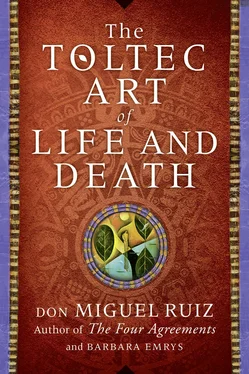“Obey your mother. Time is running out, and I will not return without you.”
“And I ask you to join me, Sarita. There is nothing left for you but physical suffering. I would spare you that.”
“Do not paint me as a victim!”
Miguel regarded her thoughtfully. She was not a victim. She was a woman who abhorred the ravages of age and would not willingly face the end alone. They had collaborated for fifty years now, like two children inventing games—games, in this case, that changed the dreams of human beings. In his absence, there would be no one like her left in the world . . . but did she understand the price his body would pay to come back? Could she imagine the extent of his physical pain? Something stirred in him, and he felt the force of his love begin to shift the dream. He looked into his mother’s eyes and spoke to her, choosing his words carefully.
“If this body lives, Madre, it will need my presence; but it will also need something of the old structure.”
“Was it not I who taught you about the human form ?”
“There’s no form left—no belief system.”
“Such things can be retrieved!”
“Who was Miguel, Sarita? How can he be recovered, when there is no answer to that question? There are only memories to point the way. Memories lie, and the lies change with every telling. Memories may give direction, but never truth.”
“They will give me you !”
Miguel looked at his mother, a vision of shifting moods and remembered phrases. She seemed real, warm, and so sweetly unassuming in her nightgown and slippers that he was tempted to change the conversation to everyday things. He wanted to tease her again, to make her laugh as he used to. He wanted to hear her calling him to breakfast, or casually gossiping about people he didn’t know. He wanted to feel her fingertips on his forehead, over his heart, as she gave him her usual morning blessing. This was not an ordinary encounter, however. She had found him somewhere between life and death. She had found him because life had laid a path for her . . . and now, instead of yielding to this fragile dream, she was attempting to manage it.
What could he offer her as consolation for a lost son? How could he calm her fears as he once did? She was fighting him, and it appeared she would not stop. She seemed set for battle, even as she stood unsteadily before him, an old woman in a cotton gown and slippers. She would be the warrior, frail as she was, until it became obvious that there were no more wars to fight. What she hoped to win he could not say, but she was plainly determined.
Miguel offered her a smile. “You have a shopping bag, I see. Was it your intention to put me in it?”
“I might have!”
“It appears to be full already.”
“Here!” she exclaimed, her voice raspy from all the talk. He noticed her renewed enthusiasm and let her talk. “I brought the usual tools of our trade! Perhaps we can do ceremony together . . . just as we used to. Prepare yourself, m’ijo . Make yourself pure, and bring the forces of life toward our task.”
Miguel did nothing. He watched his mother patiently as she bent over her bag of treasures, one hand resting on his knee and his eyes shining with a curious light. He had been a shaman once and knew what was coming. The time was over for tricks, but how could he tell her that? The dream was over for Miguel, the main character of his story, but she would not listen. She would insist on having her son returned to her, even if he was a faintest copy of the truth, living within the most tenuous form.
Sarita began lifting items out of her shopping bag with pride and newfound enthusiasm. Could it be that she and her playmate of old were to invent yet another new game? Could fortune be on her side again? She felt the nearness of her ancestors and smiled. Out of the heavy bag she pulled a small drum and stood it on the ground, carefully placing a stick wrapped in ceremonial red ribbon on top of it. From a tiny pouch she shook out a collection of Aztec shards and lined them up neatly on the skin of the drum, adding to the arrangement a glorious eagle feather. That done, she stacked three gourds at the base of the drum, along with a pot containing charcoal and frankincense. Satisfied that she had laid the groundwork for all that was to come, she reached into the bag for her precious icons, and one by one she placed them on the limb of the tree.
“Now! We start with the Son of the Virgin, of course!” She balanced a small figurine of Jesus on the broad limb of the tree. It was a clay piece, daintily sculpted, showing the Lord holding a lamb. Next, she brought out the Virgin Mary, arms opened in an ascension pose. “There. Mother and Son united,” Sarita said with satisfaction, then muttered a prayer.
Miguel watched in silence as she finished her prayer and hesitated, apparently unsure what to do next. Pursing her lips, she leaned over the bag again. After a few seconds of rummaging noisily, she straightened up, a brass statue of the Buddha sitting heavily in both her hands. She looked at her son, as if expecting a challenge.
“And why not?” she asked. “Is he so proud that he cannot come to the aid of a fellow teacher?”
“He is not proud, although he has good reason to be,” said Miguel calmly, nodding his head toward the lights that flickered above him. “His message still moves the dream of humanity.”
“Precisely so!” The old woman lifted the statue onto the tree, wedging it in the joint of two limbs. Closing her eyes, she mumbled another prayer, presumably to the ultimate bodhisattva himself. With another sigh of satisfaction, she reached into the bag again. This time she found a more delicate statue, wrapped in a silk cloth. It was a Chinese goddess, represented beautifully in pale jade. After a few seconds of consideration, she placed it beside the Virgin.
“A mother hears the cries of her children. She will answer.” Sarita looked at the two women, standing gracefully under the light of the living world, and she smiled. “Yes, a mother answers.”
Next came another brass figure—this one an elaborate version of the war goddess Kali. Miguel wondered how many households his mother had ransacked to fill her bag with fetishes. It was doubtful she knew the names of these goddesses, much less their significance.
“What do you think?” Sarita asked. “She seems like a fighter, but I don’t want her to think that death is our objective.”
“You may see that there are greater things to battle than death.”
Sarita looked at her son as if seeking comprehension. He met her look, and she felt more confusion than comfort. Looking quickly away, she reached for the nylon bag and shook it. There was something left at the bottom. Grabbing it, she brought it out with a shrug and a sigh. It was his childhood plastic figure of Popeye, pipe in mouth and both biceps bulging. This she had found in his dresser drawer.
“Now we can talk!” exclaimed her son, laughing. “I am what I am!”
Sarita smiled with satisfaction. The meaning of this silly item eluded her, but she had been right to suspect that it would please him. She withdrew her withered hands and tugged on her cotton gown nervously. What else? Feeling around for a pocket, she withdrew a necklace: a silver chain holding a star of David. This she hung from a leafy twig, and gave it a spin. Then she took the gold crucifix from around her neck and draped it over the same twig. The two charms spun and gleamed in the surreal light, sending little sparks of fire into the upper branches of the tree. “Old gods, young gods. How are they different?” she whispered.
“Why bother with gods at all?” her son asked. “Why call on the saints and the ancestors? Why bring any of them to a conference between mother and son?”
Читать дальше












